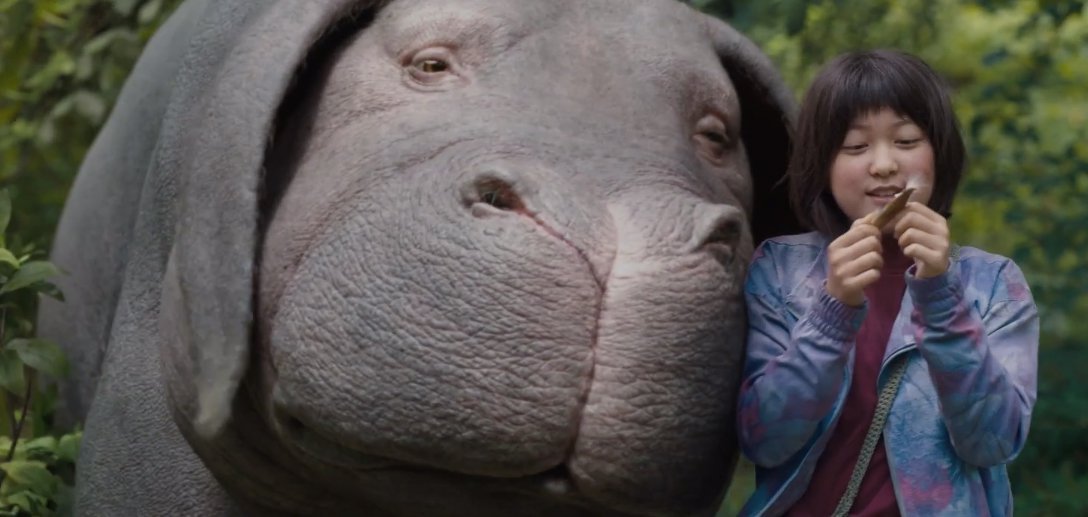By Eric Card
Northwest Asian Weekly
 Okja is huge. She looks like a hybrid between a pig, hippopotamus, and elephant, and maybe a few other things. She poops in every which direction, with fiery speed. She is tender, smart, and altruistic, but clumsy, aggressive, and driven by pure instinct, flatulating at any given time. She is an amalgamation of a lot of things, and she’s the perfect representation when it comes to the genre-defying, tonal approach to the film, named after its main subject, “Okja.”
Okja is huge. She looks like a hybrid between a pig, hippopotamus, and elephant, and maybe a few other things. She poops in every which direction, with fiery speed. She is tender, smart, and altruistic, but clumsy, aggressive, and driven by pure instinct, flatulating at any given time. She is an amalgamation of a lot of things, and she’s the perfect representation when it comes to the genre-defying, tonal approach to the film, named after its main subject, “Okja.”
Written and directed by Bong Joon-Ho (“Snowpiercer” and “The Host”) of South Korea, Okja is described as a “super-pig,” a new breed discovered by global corporation Mirando, that can help to solve the worldwide hunger epidemic, at least according to CEO Lucy Mirando (played by Tilda Swinton). As part of its marketing campaign, they have bred 26 super-pigs to be raised in farms across the world. After 10 years, the biggest and best super-pig will be announced and celebrated to further promote the project to fight world hunger.
Skip 10 years ahead, and we are taken to a remote and beautiful mountainside in South Korea. This is where Okja is first introduced, alongside 14-year-old Mija (played by Ahn Seo Hyun) and her grandpa. It is clear from the onset that Mija and Okja have a special relationship that goes beyond the mundane interactions of a farmer and farm animal. They forage for food together, nap together, and look out for each other in times of danger. Furthermore, Mija seemingly has the ability to communicate to Okja by whispering into her ear. Their peaceful life is suddenly interrupted by the employees of Mirando, who soon after arriving announce Okja as the winner of the super-pig competition, taking Okja away to be revealed to the public in New York.
That’s when the floodgates open. The pacing picks up quickly. The tone is unexpectedly shifted. Peripheral characters start to become caricatures, some to the extreme. The musical choices often times contradict what we see on the screen, at times giving it a vaudeville flavor. Even the genre starts to feel ever-evolving. There’s a little bit of everything: drama, action, comedy, science fiction, and even a little horror. It’s lighthearted and uplifting, yet somber and disturbing.

In her quest to follow, rescue, and reunite with Okja, Mija is caught in a crossfire between two groups: Mirando, the greedy, capitalistic corporation, and the Animal Liberation Front, an organization that helps to free captured animals and expose companies like Mirando of its cruel and unethical practices to the general public. While the film unsubtly displays the aftermath of human consumption, it admirably does a fair job of poking fun at both groups through satire and physical humor.
The film is certainly ambitious, as it juggles a multitude of topics. While the film keeps its main focus on Mija and her innocent and unconditional love for Okja, it also tackles themes of corporate greed, the ethics of meat consumption, animal cruelty, muddled intentions of activists, and loss of innocence. When considering all of this, “Okja” can certainly feel messy and uneven, perhaps even preachy and overstuffed.
However, in the end, the film balances the humor and drama tremendously. Considering the subject at hand, “Okja” never feels too vulgar, nor does it take it too lightly with its playful digs. The tonal shifts are handled with care, even though they can naturally feel unhinged at times.
In a film industry saturated with reboots, sequels, and superhero movies with very little to say, “Okja” is a breath of fresh air.
The film has lots to say, and does so in an original, thoughtful, and, most importantly, entertaining way. Okja looks, sounds, and acts like nothing you’ve seen before, and the film itself follows suit.
“Okja” is available for streaming on Netflix.
Eric Card can be reached at info@nwasianweekly.com.



